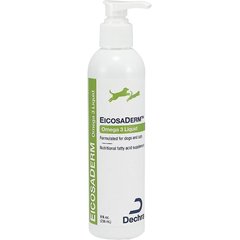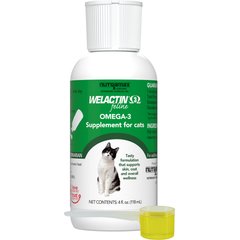Fish Oil for Cats
Maryviolet/iStock / Getty Images Plus via Getty Images
Keeping your cat healthy is an important job for all pet parents. But when it comes to offering your cat supplements, it’s hard to know what’s best for your specific kitty—especially with the staggering amount of options available. For example, can cats have fish oil?
Fish oil supplements for cats can be a great addition to their daily regimen and offer many benefits. Here’s what to know about fish oil for cats.
What Is Fish Oil?
Fish oil is a supplement made from coldwater fish—commonly salmon but also mackerel, trout, and some shellfish such as mussels, oysters, and crabs. Fish oil is a great source of two omega-3 fatty acids: docosahexaenoic acid (DHA) and eicosapentaenoic acid (EPA). Omega-3 for cats is vital: DHA is required for growing kittens, while EPA is important for all life stages.
Humans have used fish oil for hundreds of years. It was first described in medical journals for the treatment of rheumatism (arthritis and other diseases affecting the joints). In cats, fish oil is used for similar reasons, as DHA and EPA are known to act as natural anti-inflammatory agents.
Fish oil supplements for cats come in a variety of different preparations, most commonly as a liquid but also as a gel capsule or pill. Fish oil is also found in some cat foods, and there are also fish oil treats for cats.
Is Fish Oil Good for Cats?
Fish oil can be a good fatty acid supplement for cats, but it should only be given under the guidance of your veterinarian. Fish oil can benefit cats with certain health concerns, including:
Skin Allergies and Skin Disease
Fish oil is commonly given to cats with allergic or inflammatory skin disease. It can help reduce itchiness by decreasing the production and release of inflammatory stimulators called cytokines and improve a cat’s dry, flaking skin.
Arthritis and Joint Disease
For cats with arthritis, fish oil can help decrease inflammation in the joints. Studies show that cats given both EPA and DHA supplements in their diet, along with green-lipped mussel (a glucosamine/chondroitin source), had a noticeable improvement in their mobility.
Kidney Disease
Fish oil has been shown to help decrease a cat’s blood pressure and help prevent protein loss into the urine, thus slowing down the progression of kidney disease in cats. One study determined that cats with kidney disease that ate diets with a high EPA content experienced longer survival times.
Heart Disease
Fish oil can help lower and regulate a cat’s heart rate, thus lowering the risks of atrial fibrillation (a potentially fatal heart arrhythmia). Omega fatty acids for cats are also thought to help decrease triglycerides in the body, which can contribute to heart disease in cats. Fish oil may also help prevent blood clots.
Inflammatory Bowel Disease (IBD)
Fish oil is known to decrease potentially harmful triglycerides and promote less inflammation, which can help with both inflammatory bowel disease and pancreatitis in cats.
Epilepsy, Seizures, and Brain Health
DHA is important for promoting brain health and development in cats. For this reason, fish oil for cats has been shown to be helpful both in developing kittens and in older felines with cognitive dysfunction.
Diabetes and Obesity
Diets containing DHA and EPA have been known to help make insulin more effective in obese cats with or without diabetes. This helps decrease body fat and allows cats to use glucose more effectively when they have diabetes. In overweight cats without diabetes, fish oil has been associated with decreasing the risk of developing diabetes.
Cancer
DHA has an ability to shrink tumors, and studies have shown that it can help work against cancer by not allowing cancerous cells to divide.
How Much Fish Oil Can I Give My Cat?
Fish oil for cats is dosed depending on the specific product you’re using. The packing should have the recommended dosage dependent on a cat’s weight and/or age.
For more specific instructions on how much fish oil to give your cat, speak to your veterinarian, who knows your pet’s medical history best.
The Best Fish Oil for Cats
When looking for any cat supplement, make sure it has the seal of approval from the National Animal Supplement Council (NASC). The NASC ensures that products meet its quality standards for pets.
Some of the best fish oil treats, supplements, and foods for cats include:
-
Zesty Paws® Omega Skin & Coat Tuna Mousse Lickable Squeeze Supplement for Cats
-
Nutramax® Welactin® Omega-3 Fish Oil Liquid Skin & Coat Supplement for Cats
-
Vetoquinol® Triglyceride OMEGA Omega-3 Fatty Acid Small Breeds Supplement for Cats & Dogs
-
VetriScience® Renal Essentials Feline Soft Chews Kidney & Urinary Supplement for Cats
-
All Hill’s® Science Diet®, Royal Canin®, and Purina® kitten foods are enhanced with omega-3 fatty acids, particularly DHA
-
Hill's Science Diet® Adult Urinary Hairball Control Dry Cat Food
How To Give a Cat Fish Oil
How to give your cat fish oil also varies by product. It can be as simple as swapping out their food for one that’s rich in omega fatty acids, or you can add a liquid fish oil supplement directly to their existing diet. Gel capsules can be eaten directly or opened and put into your cat’s food as well. Cats can also take fish oil supplements in the form of a chew or paste treat.
Side Effects of Fish Oil for Cats
Fish oils are generally safe for cats, but side effects can sometimes occur, as with any medication or supplement. At high doses, fish oil can cause diarrhea, vomiting, lethargy, and a fishy odor to the breath or skin. Fish oil applied to the skin might also cause a reaction.
In cats, it has been noted that excess fish oil can cause blood clotting changes, which might lead to excessive bleeding issues and bruising. If you notice any of these side effects in a cat taking fish oil, discontinue the supplement. If symptoms persist for more than 24 hours, have your cat examined by their veterinarian as soon as possible.



